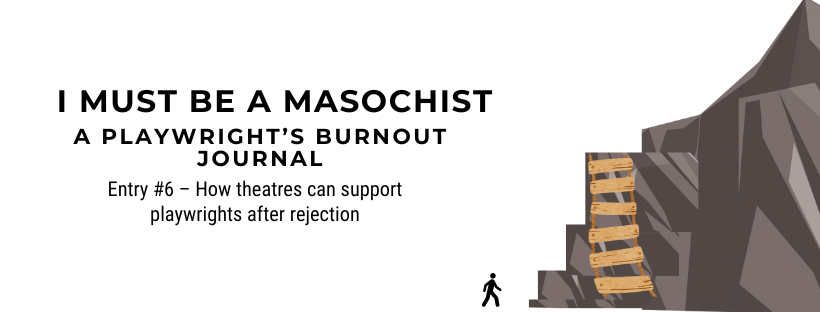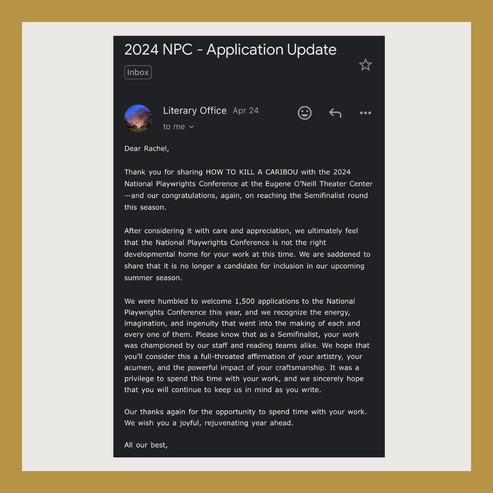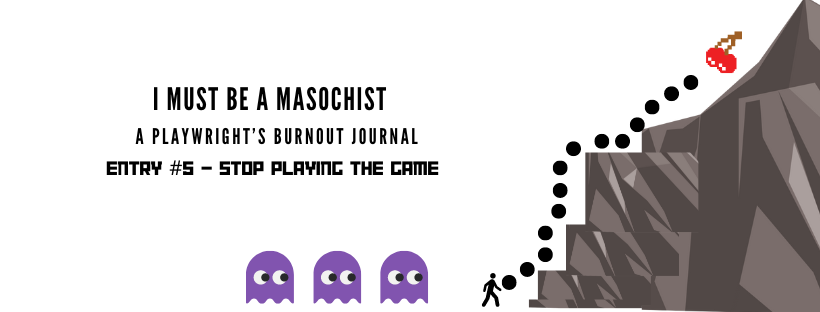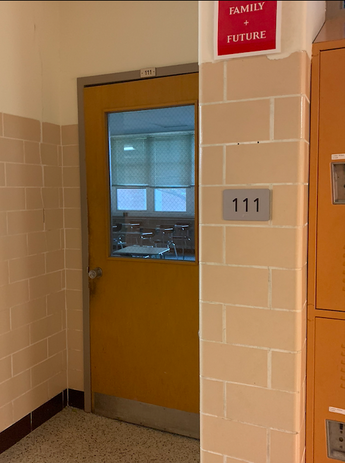|
I, along with roughly a hundred other playwrights who were listed as semi-finalists, received our O’Neill National Playwrights Conference rejection email for my play How to Kill a Caribou. The institutions that produce these playwriting competitions typically send an email rejection letter. The National Playwrights Conference’s email was sincere and empathic. It states that we playwrights should be proud of making it to the semi-finals. People at O’Neill championed our work. And the fact that we made it to a select group of 250 plays out of 1500 that submitted is, “a full-throated affirmation of your artistry, your acumen, and the powerful impact of your craftsmanship.” I am grateful. I am proud of myself. But what now? If you’re unfamiliar with the National Playwrights Conference, here’s the gist. About the O'Neill National Playwrights ConferenceThe “O’Neill,” is one of many playwriting competitions. This particular playwriting competition has been around since 1964 developing plays from some of the biggest names in playwriting like Dominique Morisseau, Martyna Majok, Beth Henley, and Samuel D. Hunter — many of whom have gone on to win the Pulitzer Prize, Obie, and MacArthur awards. The O’Neill Playwrights Conference is a premier developmental opportunity for fresh, new plays that have never been produced. It is a chance for playwrights to collaborate with leading theatre professionals, workshop plays, network, and potentially, launch their careers. What happens after rejection?What happens to all those plays that didn’t advance? Whenever playwriting competitions reveal to me how many applications they received, I can’t help but get this feeling of dread. I think about a playwriting friend who asked, “What does that mean for the state of the theatre industry that they don’t have space for everyone?” Where are those plays supposed to go? Unfortunately, many plays will be tucked away in a desk drawer or filed in a computer folder labeled “Old Plays.” I don’t think it has to be that way. I'll explain how theatres, festivals, and institutions can help support new plays after rejection. Give me the cue-to-cue
What is new play development in playwriting competitions?New play development is the support of new theatrical works. The support can be: Financial: A theatre provides funding to the playwright or team of artists so they may focus their time and energies on the creation of the new work. Why is this important?: Many playwrights have to juggle full-time jobs on top of their artistic endeavors. Having the financial freedom to dedicate 100% of your time to writing your play helps reduce burnout and increases writing productivity. Developmental support: A playwriting competition provides the playwright with the tools, space, structure, and resources needed to develop their new play. Why is this important?: Often referred to as new play development festivals, new play workshops, or play readings, these opportunities give playwrights access to resources they might not be able to find on their own. Theatres tap into their networks to bring together directors, dramaturgs, stage managers, actors, designers, etc. The playwright now has a set period to work on their play aided by the professional advice of other artists. We can see the play on its feet while actors read lines in front of an audience. Promotional support: A theatre company, network, or institution increases the new play and playwright’s public awareness (brand awareness) through marketing and advertising. Why is this important?: Word of mouth is often the best form of advertising. Recommendations and reviews go a long way in theatre. If one theatre hears from another theatre that a play is worth their time, there’s a higher probability they will consider working on the play. What challenges do playwrights face?I shared a few challenges playwrights face above — financial freedom, access to resources, and limited to no brand reach. For me, one of the biggest challenges is playing a game of numbers. I’m not even talking about competition. Healthy competition breeds better writing. Most playwrights are taught to get used to rejection. You’ll submit to 100 playwriting competitions in a year and maybe be accepted into 5-10 of them (maybe). Sometimes you might not be accepted at all. I’ve previously shared why playwrights should not let rejection get them down. You don’t need to wait for anyone’s permission to share your voice. If you get rejected, move on and find collaborators who see the value in your work. But let’s dig into rejection for a moment. Why are the odds not in our favor? I’ll use the O’Neill National Playwrights Conference as an example. Why rejection might happenFifteen hundred new plays were submitted. Think about that number. Picture 1500 pencils. 1500 apples. 1500 cats. It’s a lot. Now, think about 1500, but it’s plays. Full-length plays. A typical full-length play is 60 - 120 pages. For the sake of this example, let’s say every play was 90 pages. 1500 plays at 90 pages each is 135,000 pages total. Have you ever read anything that was 135,000 pages? Now, of course, the O’Neill uses teams of play readers that divide up the plays so it is much more manageable. No one person is reading 135,000 pages in one sitting. That is still a ton of work. And play readers are people. They have opinions, tastes, favorite and hated genres. They get overworked and tired. They have bad days and good days. I often joke that when I’m rejected, it’s because the person reading my play spilled coffee all over their white shirt, got a speeding ticket, stubbed their toe, and then had to read my play which was number 18 out of 20 for the day’s quota. It’s all subjective. What do we do with 1500 new plays when we only have space for 8? Theatre companies across the globe are popping up, asking, searching, and demanding new plays to make their way onto stages. If theatres want to help new plays get produced, (that they cannot produce) here’s how. 3 ways theatres can support new plays and playwrights after rejection1.) Introduce the playwright to your network. I’ve been involved with so many festivals that said they loved my work. They just don’t have the (budget, resources, or audience) to produce it on their stage. What I would love to see them do is share my play with their network. Write an email, and recommend us to a colleague. Call up your people, put our plays in front of them, and tell them what you like about it and why it would be a good fit for their theatre. 2.) Write a review. There are various public platforms where you can provide your stamp of approval for the world to see. The New Play Exchange (NPX) is one of my favorites. It is an online platform that offers playwrights space to post their new plays for theatre companies to download and read. If you like a play, you are encouraged to leave a positive review. You can also write a review on the playwright’s Facebook page, YouTube, or blog. 3.) Be loud on social media. Follow, like, comment, and share the playwrights’ posts and social media profiles. It takes a simple tap of the heart icon. Suddenly, the mystical algorithm promotes us to the public. Share our profiles and follow along on our journey as writers. Keep liking posts and stay connected even after the playwriting competition is over. Share the network powerYou can do any one of these things together or separately. Mix and match. Look, I get that budgets are tight and stage space is limited. But don’t underestimate the power you have through your network and your own institutions’ prestige. There are 1500 new plays out there and that’s from just one competition. Help keep as many of those new plays from ending up stashed away and forgotten. "You are in Control"This phrase has been on repeat in my brain since I returned to Chicago. Since mid-August, I’ve been incredibly fortunate to attend the La MaMa Umbria International Playwright Retreat. For ten days, 18 brilliant playwrights and myself stayed in a breathtaking villa in Spoleto, Italy. Our guest instructor, Chay Yew, led us through various writing prompts, imagination exercises, and thought starters to help us craft our writing. To say I was intimidated by this talented group of people is an understatement. I was terrified. I was sure my attendance in the program had to be a mistake. I am a middle-class, paycheck-to-paycheck girl from the southside of Chicago. People like me don’t “go to the beautiful Italian countryside” to “reset” and “find inspiration.” Looking around the room at my fellow writers – artists you should be following because their writing will blow up one day – I was amazed by their questions about the state of the theatre industry and their uncertainty about the future of new play development. Between the writer’s strike, the rise of A.I., and the pandemic’s decimation of many theatrical institutions, we all came in with a similar question for Chay and each other: How do we and our new plays survive? We all shared career paths, trajectories, tips & tricks, connections, how-to’s, do’s & don’ts, failures and successes. We searched for a formula to crack the code on the evolving new play development landscape. By the end of the retreat, what I discovered was not a “one-size-fits-all” formula. Instead, I needed to shift my perception of myself and place myself in the driver’s seat of my playwriting career – not a passenger waiting for a theatre to pick me up. 3 Ways To Find New Play Development Opportunities We will all come across ensembles, theatres, and institutions that value our plays and us as writers. These places are our homes. No matter how big a budget or small a black box, these theatres want to nurture our voices. Stay with them and invest in them. Their admiration is faithful.
In any playwright’s career, we will meet numerous people and walk into rooms we never dreamed we could enter. But not all that glitters is gold. Find your people, support each other, and put your voice first, always. If the play is “good,” institutions will notice but don’t rely on them to drive your career. You are in control. Find the people and places that see your value. Recently, I had the privilege to go back in time. Depending on your relationship with your past, I highly encourage everyone to time travel. It’s pretty simple to do (for me at least). Here’s how I time traveled. I got in my car – a deep blue, Jeep Wrangler – and turned on some music. I found an old playlist that migrated from my 2004 iPod (remember those?) via iTunes to my Apple playlist. The playlist is titled, “Hyper.” I can’t quite remember why 15/16-years-old Rachel chose that title. Maybe I needed it to get revved up for school? I guess “hyper” at the time meant a mixture of Destiny’s Child, some solo Beyonce, Paramore, Alanis Morrisette, Fall Out Boy, Akon, Rihanna, Gwen Stefani, a sprinkle of Janet Jackson, Linkin Park, Simple Plan, Lil’ Jon, Green Day, My Chemical Romance, Petey Pablo, and Pitbull. By the time Chester Bennington (RIP) roared, “I’m one step closer to the edge…” I was already out of Rogers Park, and halfway down Lake Shore Drive, heading south. I got on the Stevenson, exited at my usual stop, Pulaski, to visit to my folks for a second. Then, I continued from West Lawn (my childhood home) and traveled further into the South Side of Chicago until I reached 115th and Pulaski. I made a right and just as Lil’ Jon and Usher got to their final “Yeah,” I parked my car in front of Marist High School. I already gave plenty of hints about how roughly old I am, so I won’t be saying anything like, “It’s been <insert number of years> since I parked outside this school in my parents’ white Jeep Wrangler.” But, let me just say, Marist recently posted a celebratory memory of going co-ed 20-years ago (so rude). Anyway, why am I here at my high school? Well, I’m here to help coach the Speech and Acting Team. I walk through the halls. Absolutely NOTHING has changed. The lockers are still the same, the tile floors, the layout, all of it! They upgraded some tech, of course, and the bathrooms got a renovation, but for the most part, this is exactly how I remember it. I easily find where the Speech and Acting Team is practicing. All you have to do is follow the sounds of voices pivoting from character to character. I follow the voices until I find a student talking to a wall, telling a passionate story about getting her first period. Only speech kids are wall-talkers. Once a Wall-Talker, Always a Wall-TalkerI enter the classroom where the team is gathered – they are practicing a mock tournament today, so everyone is dressed in suits, button downs, dress pants, etc…They look like young law students getting ready for their first trial. As I listen to the Decs (Declamation), OOs (Original Oratory), SOS (Special Occasion Speaking) and Informative speeches, I can tell the students are nervous. However, to an outsider, you would think these are some of the most confident high schoolers on the planet. Their bodies are poised, voices controlled, eye contact is specific…their communication skills are, quite frankly, unmatched for any average 14-17-year-old. I sit at a desk and watch each student perform – taking notes, offering critiques, etc – each time I look up from my notes at the student in front of me, I can’t help but feel like I’m looking in a mirror. Then, a rush of time nearly takes my breath away as I feel my entire life flash from 14-years-old to now. I stood where these students stood. Unaware of where I would go to college, oblivious to the obstacles of adulthood, naive to my future heartbreaks, ignorant to all the tough decisions and forks in the road I would meet. But most importantly, standing in this student's spot <insert number of years ago>, I had no idea where my time with the Speech and Acting Team would carry me. At the time, this was just an after school club. A place where I met friends and found a group of odd-ball kindred spirits. I felt supported and it’s through that support, I grew in confidence. I didn’t know it would become my career, my passion. Time Will TellI can unequivocally say, the Speech and Acting Team is the reason I am a writer today. I just wish I could go back in time and tell teenage Rachel that. All these questions and anxieties she had about the future, I just want to tell her, “Trust me, it works out!” I want to tell her that times will be tough. You’re going to face a lot, and I mean A LOT of rejection, flakey mentors, and gut-wrenching criticism that will make you curl-up into a ball on your couch. You will want to give up and think pursuing a career as a writer was the dumbest thing you’ve ever done. But then, you remember where you came from. I would tell teenage Rachel, The Marist Speech and Acting Team from your era has been long disbanded, but you create your own support team. Friends and family that help uncurl you from that ball and tell you to get back up. People that root for you, even if they are the only ones in the audience. But their cheers make it feel like it is a sold out room. Friends that are so incredibly blunt that when you threaten to quit and become an accountant they respond with, “Rach, you can’t quit. Writing is the only thing you’re good at, and you suck at Math.” At the end of the practice, I made my way out of the school and I passed by a classroom, THE classroom. The classroom where it all began <insert number of years ago>. I walked into this classroom scared, confused, and anxious about my future. Now, I stand in front of the classroom and feel my past, present, and future mix together into this feeling of gratitude.
I am so grateful to my friends and family that believed in me all these years, for every good and bad critique, for every practice session, and for every minute I was in that classroom, talking to walls. Thank you, Speech and Acting Team, for my past, present, and future. |
About the BlogI write plays. I tell stories. I create content. I vent. I offer advice. I hope people will learn from my mistakes. Categories
All
Archives
April 2024
|










 RSS Feed
RSS Feed